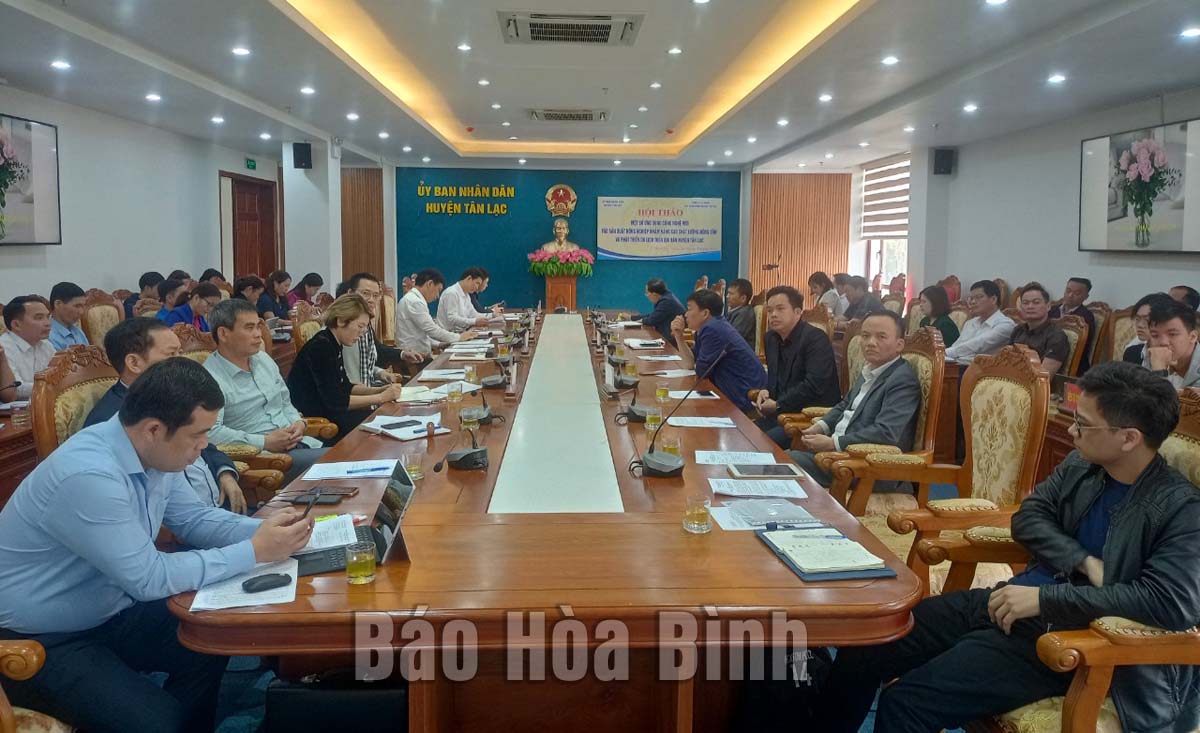
(HBO) - Recently, the People's Committee of Tan Lac district has collaborated with the Intellectual Agriculture Group joint Stock Company to hold a workshop on a number of the new technology applications in the agricultural production to improve the quality of agricultural products and develop tourism in the area of Tan Lac district.

The conference overview.
In recent years, all levels and
branches in the district have focused on directing and guiding the people to
change the structure of plants and animals. Up to now, a number of production
areas have been gradually formed in the direction of valuable goods and
specialties, bringing the high economic efficiency. The cultivated area of some
key crops has been increasing, the area of rice is 4,800 ha, with an average
output of over 27,500 tons a year. The area of maize is 4,000 hectares with the
average output of over 19,000 tons a year. The area of sugarcane is 1,125
hectares with the average output of over 91,800 tons a year. The area of citrus
trees is over 1,532 ha, of which the area of orange trees is 275 ha, that of pomelo
trees is over 1,100 ha with the average output of 16,500 tons a year.
Currently, in the whole district
there are 27 cooperative groups, 27 cooperatives in operation. In which, there
are 22 cooperatives of agriculture, fisheries and livestock. Typically, it is
the cooperative producing, processing and consuming Tan Lac Red pomelos; Quyet
Chien safe vegetable production cooperative; Nhan My Fruit and Vegetable
Cooperative… However, the district's agricultural production is still small and
fragmented; the proportion of agricultural production applying high technology
is still low, creating a small amount of output for the products...
At the workshop, the delegates
have been introduced about the digital transformation in production and
preliminary processing of pomelos, plating factories and high-tech rice linkage
chains, developing the traditional and spiritual tourism associated with the
agricultural experiences...
Hoa Binh province is undergoing a dynamic transformation amid Vietnam’s national digital transition. Building on Poliburo’s Resolution No. 57-NQ/TW on breakthroughs in science, technology, innovation, and national digital transformation, the province has rolled out a wide range of practical action plans. A standout initiative is the "Digital Literacy for All” movement, an effort to ensure that no one is left behind in the digital era.
Hoa Binh province is undergoing a dynamic transformation in the wake of the national digital transformation movement. Building on Resolution No. 57-NQ/TW of the Politburo on breakthroughs in science, technology, innovation, and national digital transformation, the province has implemented a wide range of practical action plans. A standout initiative is the "Digital Literacy for All” movement ambitious effort to ensure that no one is left behind in the digital age.
With a spirit of unity and proactive problem-solving, the Party Committee, the government and the people of Dong Lai Commune (Tan Lac District) have made great strides in implementing the resolutions of the 24th Party Congress of the commune for the 2020 - 2025 term. Focusing on leadership and practical actions, the commune has brought the Party’s resolutions into daily life, creating strong impacts and pushing the local development forward.
Amid the nationwide push for digital transformation, young people in Hoa Binh Province are stepping up as dynamic pioneers, applying technology to enhance Youth Union operations and expand the reach of youth-led initiatives. Through creativity and adaptability, Youth Union organizations at all levels have introduced a series of practical solutions, contributing to modern governance and community development.
In recent years, An Nghia commune, located in Lac Son district, has stepped up administrative reform, focusing on improving the quality and efficiency of its single-window service unit for receiving and processing administrative procedures. These improvements have helped create favourable conditions for local residents and organisations to handle administrative procedures, contributing to the commune’s broader socio-economic development.
The Prime Minister-approved master plan to develop the multi-use value of forests ecosystems through 2030, with a vision to 2050, aims to improve the management and sustainable use of forest resources, create jobs, increase incomes, and improve the living standards of ethnic minorities, people in mountainous and remote areas, forest workers and those living near forests.



